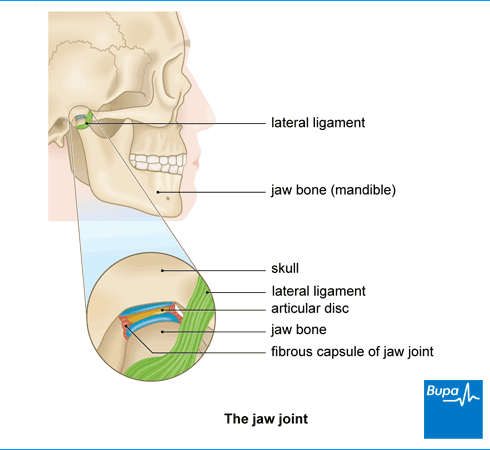It’s more common than you may think for your jaw to click, and yes it can be very annoying and irritating. A clicking jaw, also known as ‘TMJ’ can cause stiffness in the jaw, making it uncomfortable to bite properly, and causing pain and tenderness around the jaw and neck area. This can make your jaw click on one side, and sometimes on both sides, which can make it difficult to bite how you used to, therefore affecting you’re eating.
Exercises for jaw clicking can stop your jaw from clicking and causing discomfort by relaxing and easing the muscles in the affected area, helping it eventually go back the way it was. The excises are easy to do, and are great as it costs nothing to do, as long as you do them regularly and take time with them, you should notice a big different in a matter of weeks. The movements involved should be slow, easy and repetitive.

Listed below are some popular exercises we recommend for TMJ difficulties. This clicking jaw treatment list has worked well in common cases of jaw problems for previous patients.
- Apply heat on both sides of your jaw, using a hot water bottle or whatever is easier for you, take a warm towel, removing excess water before applying by wringing out, and apply gently to both sides of your face. This will increase the blood flow to your jaw to the muscles. You should repeat this 2-3 times, this then should make the jaw feel a little more flexible.
- Massaging your jaw it another great way of helping your muscles in the jaw, simply take two fingers and massage the bone in both sides of your face. Make sure you do this exercise as gently as possible, as if too much pressure is applied, you may cause further pain.
- Ibuprofen is a great pain relief as it also helps with inflammation. Try taking these rather than Paracetamol, as it has that extra benefit. Although please remember this is just a temporary measure of dealing with the pain, and you shouldn’t become dependent on them.
- TMJ has been connected to deficiencies of magnesium and calcium in your body, so we advise that you make sure you enough vitamin C and E in your diet. Restoring the minerals can eliminate this being the reason you’re having problems with your jaw. Also it’s nothing wrong with giving your body a boost of vitamins!
- On this exercise, there any different sections, its advised to them them one after the other. Firstly, try putting your tongue on your palate (the roof of your mouth) then open your mouth while your tongue is still in place, then breathe in slowly for two counts, then out slowly for two counts. Repeat this 10 times. Next, make a fist with your hand and place it directly underneath your chin. Balance the weight of your first and press as you try to open your jaw. This energy should then relax your jaw bone, also known as the mandible. If possibly it’s best not to let your jaw click while performing this exercise. You should hold the position for 10 seconds, then release and repeat 10 times. Next. Take your fist and press it against the left side of your jaw, just below the hinge. Then gently press your jaw against your fist and maintain a steady pressure. This also should relax the muscles in your jaw with the isometric energy. Again, hold for 10 seconds, repeat for 10 seconds, then repeat on the right side of your jaw. Another exercise you can try similar is press against your jaw with one finger on each side; apply the pressure evenly to both sides. Open the jaw very carefully and slowly to avoid clicking the joint. If your jaw clicks, release and start over, but this time open more slowly, the pressure on each side should allow your jaw to open and close in the correct alignment. Once you have carried out all of these exercises, with a loose jaw and mouth, hold your chin between your thumb and your second finger. Carefully and loosely, shake your chin backwards and forwards, allowing your jaw to relax and release. If this exercise causes you pain, then immediately stop. If all ok, continue until your jaw feels loose, aligned and relaxed. If possible it’s best that you repeat these exercises once a day or more if able. With repetitive excises your jaw will eventually memorize the relaxed positions and will do them automatically.
- Try not to clench or grind your jaw, some of us do it when we don’t even realise, which can be caused by stress, anger or frustration, so just take extra care. Clenching also can lead to headaches.
- Try yoga class’s, this is a distress class which can really help, it can eliminate clenching and grinding, which contributes to TMJ problems, so this will help a lot, it will also help with headaches caused by the clenching.
- Stand up straight and watch your posture. Good posture will help fight TMJ and headaches.
- Grinding you teeth at night is one of the biggest things that makes TMJ problems worse, so get yourself a night guard, this will make your grind on the appliance rather than your teeth, easing the pressure of your jaw, which then prevents the headaches.
- Open your mouth as wide as you can, stretching the muscles in your jaw, repeat this about 10 times, while doing this you can also move your jaw left to right.
- Place yourself in front of a mirror, and observe how you open your mouth by opening slowly, if you notice that your jaw slightly goes to one side, try to practise so it stays in the middle, it might be a little difficult at first, but after a few times you will get used to it. You should aim to do 3 sets of 10 openings. This would be great if you can do this on a daily basis.
- Open your mouth widely until you can feel the muscles of your left and right cheeks stretching; hold this position for 30 seconds. Then slowly close until you lips meet, but do not clamp your teeth together. Repeat this 3 times. The whole process should be done again another 3 to 4 times daily when you are aware that you’re clenching your teeth.
These are the best exercises we recommend for you, if you make sure you do these daily, you should see dramatic results, and you pain will eventually die down, as your jaw will be trained to go bac to its normal working self. If you do suffer from TMJ we would advise that you see a dentist to get a custom made hard wearing bite guard made for you to wear at night, as we believe these really do help. Here at Perfect Smile Spa, in Hornchurch, Essex, we offer hard wearing bite guards which work great with our patients. For more information on the treatment we offer, or any more advice, please visit our website, or feel free to give us a call to book your free consultation. We hope this advice and exercises work for you! How can I help my clicking jaw? was last modified: July 2nd, 2018 by Dr Jas Sagoo



 132a High Street
132a High Street 01708442114
01708442114  care@perfectsmilespa.co.uk
care@perfectsmilespa.co.uk


